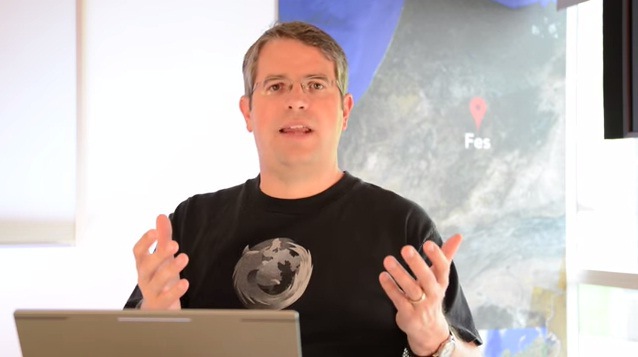Instead of writing a new post did Matt Cutts add a long update in Q&A form to his existing post from April about “How To Report Paid Links“, which received over 600 comments by readers of his blog.
The update includes 16 questions in total. Here are the questions and a summary of the answers Matt was giving to those questions.
1. Can you give me some more background on how Google views paid links?
Short answer: Summary starting in 2005
2. Now when you say “paid links,” what exactly do you mean by that? Do you view all paid links as potential violations of Google’s quality guidelines?
Short answer: paid links that pass on PageRank
3. Can you give me an example of the sort of things you’d be interested in hearing about?
Short answer: Shows example of casino , jewelry and other unrelated ads on a site about Linux
4. So in addition to algorithms, Google has people who take action on spam?
Short answer: Admits the use of manual actions in specific cases
5. That paid link example was helpful. Can you give me another example?
Short answer: Shows another example of “PPC” (Pills, Porn, Casino) ads
6. Okay, that example gives me a feel for the sort of paid links you’d like to hear about. What will you do with the new reports you get?
Short answer: A corpus to help developing new algorithms that are able to take those things into account
7. This is all well and fine, but I decide what to do on my site. I can do anything I want on it, including selling links.
Short answer: You can do what you want to and Google has the same right as well
8. It’s Google’s job to return clean/relevant results regardless of what people do on the web, so I don’t intend to send any feedback to Google.
Short answer: Nobody forces you to do that, but Google create tools for users that want to give feedback to do so
9. Are you getting pretty good reports in response to this post?
Short answer: yes
10. I’m worried that someone will buy links to my site and then report that.
Short answer: Manual processing, no automation to prevent that
11. Are you interested in things like affiliate links? Are you interested in hearing about directories in this report?
Short answer: No, not at this time
12. Hey, as long as we’re talking about directories, can you talk about the role of directories, some of whom charge for a reviewer to evaluate them?
Short answer: Fee for review is okay, as long as bad sites are rejected. If the directory has a good quality then there is nothing to worry.
13. Google’s quality guidelines say “Make sites for users, not search engines.” Put that in context for me; how does that interact with buying links?
Short answer: But webmasters do things for the search engines already, robots.txt, meta tags, code structure, site maps.
14. Suppose I didn’t want to read all the comments on this post. Did you post any other nuggets that I should be aware of?
Short answer: Tip on how to report MfA Made For AdSense sites anonymously. Click on “Ads by Google”, select “Send Google your thoughts on the site or the ads you just saw”, In the section “Add additional information here”, enter “spamreport” (one word).
15. I kinda liked that nugget. Got any other interesting nuggets?
Short answer: Talking about link sellers that claim to have undetectable paid links
16. I don’t think paid links are the biggest threat to Google’s quality. I think technique X is having a bigger impact; why aren’t you tackling that?
Short answer: No real answer to that question
Also interesting was the comment he made to the initial responses to his update.
… I think there was a tendency for a few people (deliberately or not) to look for the finest distinction of what a paid link is, when in practice the sorts of things that people have been reporting (and that we want to hear about) are along the lines of the examples I gave. Hopefully the examples help to give people an idea of what we’re talking about, and the other Q&A stuff will at least serve as a place where we can point people to.
I definitely don’t want to scare people away from directories, but I did want to mention that Google has to reserve the right to weigh a directory in what we think is the appropriate way. That is, saying “well, I reject X% of directory submissions (or paid review proposals)” is fine, but if the stuff that ends up getting linked to is still low-quality or spammy in Google’s opinion, then that’s not great.
I was not fully satisfied yet and explained the parts where I was not sure how his comments will play out in real life. I hope he will provide an answer to my comment, which I posted at his blog to put an and to some of the discussions and speculations of the past few months.
I am interested in particular about affiliate links. He only stated that Google is not interested in report of affiliate links, but did not elaborate how Google treats them and what webmasters that are using the affiliate marketing business model to monetize their site should be aware of and watch out for. Previous statements made by Google employees warrant this request in my opinion.
Thanks Matt,
your comments show that we seem to be in the same book. I am still not 100% sure yet, if we are also on the same page.
I think you would agree on the following statement:
Search is important for any online business. You should build your sites with your users and the search engines in mind. The two types of audience have different needs which do not conflict with each other in most cases.
There are a few things where a compromise is necessary. You cross the line if the visitor “search engine” becomes more important than the user and starts affecting the user experience in a negative way, which includes confusing the user, using deceptions or trick the user to do something different than he wanted to. I specifically low ability to retain users and make them come back is another sign that indicates that you should check if your priorities are in alignment with your targeted audiences needs.
If you think that this a pretty good summary of what Webmasters should keep in mind to be fine, then there is room for paid links which should be counted by the search engines equally to a similar link that is not paid.
I did buy ad placements for brand visibility. The traffic was low and the return was less than what I spent. However, I expected that to be the case, because most of the users of that other site came to it not to buy stuff, but to seek advice and help (it was a forum). 99% of the users though are my targeted audience so having the name out there visible for them to see will have them think about the advertised site at a later time when they are about to buy something and want to check available offers.
I also buy traffic for the sole purpose of driving sales. Ready to buy customers that can be converted if done properly.
The third kind of advertising is a mix of advertising by associating your brand with the cause of the site advertised on. Branding so to speak, but also to get in return some of the authority that site got. This is often the case with great, viral and free sites. They tend to get authority quickly and they get a lot of it. Their problem is, that they can’t monetize this very well without the risk of loosing this viral authority.
The traffic the site gets is nearly impossible to convert and your branding message can’t be too strong to interfere with the user experience. You loose basically on both parts, the branding and the traffic that also converts.
Now comes the 3rd factor into play that allow the advertiser to pay the needed money for the “sponsorship”, passing some of the authority back to the sponsor as a way of showing gratitude for the support without forcing the site to change their successful way of connecting with their audience. There are times where brands and advertising have to take a bit of a back seat. Unless the site converts itself to a non-profit and advertisers can write off the money as a donation, this 3rd way of monetizing is a very good alternative. There are natural limits which I hopefully covered in my first statement.
Affiliate links are kind of in between of all this.
Most affiliate links do not pass on PageRank, but some do and this is a trend that is growing. More than one network offers today a tracking and linking method that covers both needs, the need to track and the need to pass on PageRank. We covered already thin affiliate sites and sites that add little or no value. I am not talking about those.I am talking about sites that build their sites around the affiliate marketing business model and provide valuable content to the user and try to improve on the user experience as much as they can. Since they only get paid for referred business, is trust much more critical for an affiliate site than for any other site. The loss in trust translates directly and immediately into the loss of revenue without much time delay between the two.
I want to make sure that Google does not discounts affiliate links because they are affiliate links without considering all the other factors that are also used to evaluate any other site that does not use the affiliate business model.
A clarifying statement regarding this would be much appreciated. I understand that you have to be careful with such a statement to avoid that it is being used out of context and then used against you. That’s why did I write this long comment to provide you with the context needed for such a statement.
Thank you.
The answer to the last question, or better the request for a clarifying statement from Matt is especially important for me, because this whole thing caused quite some heated debate in the affiliate marketing community. I honestly hope to be proofen wrong, because in this case would I hate to be right. The recent update was a shift in tone back to a level that allows communication between all parties.
I hope this climate will continue this way and that a solution is found that is a reasonable compromise and makes all involved parties happy. At the end of the day are most of the interests and goals of all involved parties in allignment and there is no reason to make the ones that are not become the cause to break up a good and benefitical relationship and stop communication.
Cheers!
Carsten Cumbrowski
Internet Marketing Resources for marketers and webmasters. SEO, SEM, affiliate marketing, email, domains, web analytics, competitive intelligence, web development, web services, sql server and more.


